

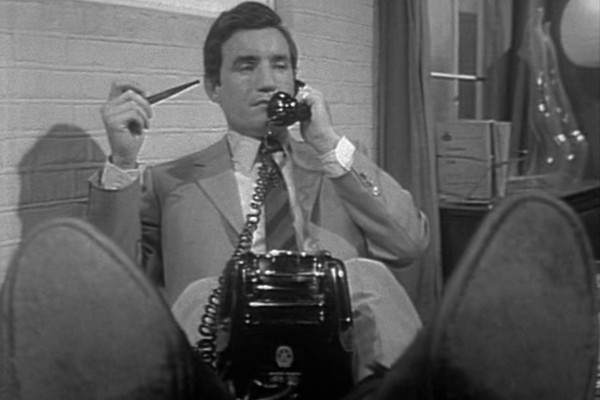
The sole episode of celebrated Doctor Who scriptwriter Robert Holmes, Nobody's Strawberry Fool is a little more straight-forward than expected, though does contain his trademark witty dialogue. The difference here is that having witty dialogue is not unique to the series, so doesn't stand out so much in the run.
There's a rare shoot out at the end of this one, combined with Dean being accidentally groped and later propositioning Hawksley as the final credits roll. Also of note is that John Savident reprises his role as the Chief from the first episode. Although just 33 when the story was filmed, it says a lot for Savident's appearance that not only could Ainley, six years older, play a younger man, but Savident could play a spy chief celebrating his retirement.
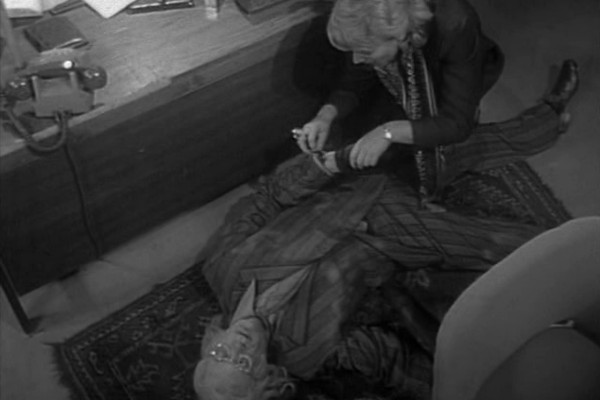
Spyder's Web doesn't have a large web presence or fanbase, yet a look through the scarce reviews out there tend to throw up one common occurrence: a comparison with The Avengers. It's particularly relevant here, as Spyder's Web goes "light SF", with a special ray that uses carbon radiation to age victims to death. Particularly amusing in this instalment is Ainley's callous Hawksworth, who can only snigger when he thinks that Dean has been killed by the ray.
The character of Hawksworth seems to be often misunderstood by reviewers, many of whom judge him purely on face value and dislike his right-wing tendencies. However, regarded as pure satire, it touches genius, as here when he cites his love of war: "There were times when I felt like drinking to the Hitlers of this world... they give us a bit of sport, anyway. Back in '51, another Johnny and I bagged six privates, two sergeants and a brigadier general in a single day's shooting. [...] North Koreans... you weren't allowed to count the southern ones." Writer Marc Brandel (Things That Go Bang in the Night) ensures that this is one of the wildest episodes, and there's a suspicion that a bigoted army colonel only named his bloodhound "Hitler" purely so Brandel could get mileage out of the "Heel, Hitler!" gag.
Critics of the series often flag up the performance of Patricia Cutts, and it's notable that, while both leads have an acting style that could be regarded as "offbeat", or a little eccentric, they do have a good onscreen rapport together. However, this episode, shot early in the run, sees Cutts at her worst. The series was filmed, like most television of the age, in extended, "as live" takes, more the work of the theatre than the small screen. Sadly, Cutts undermines the entire episode by shouting the nuance out of every line here, as if projecting to the back row rather than delivering her dialogue to a television audience. It's easily her weakest - and loudest - performance, something that does, sadly, detract from an otherwise fun (albeit silly) episode.
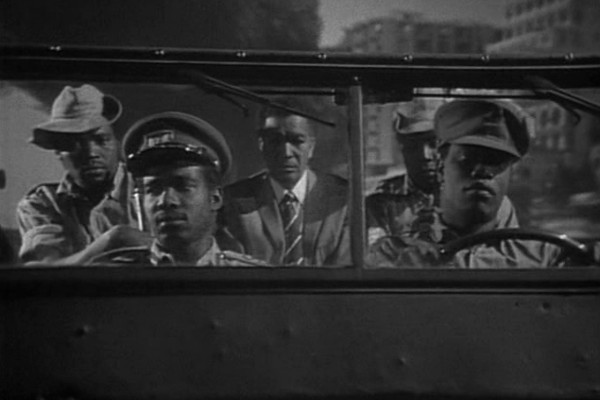
Spyder's Web has some slight racial content - not uncommon for the era - most of which is there for satirical affect. Ainley's character is a semi-serious depiction of an old school soldier, very much a 70s take on Bulldog Drummond. (The character is referenced here, with Charlotte insisting that he was "brought up" on Drummond... "we were just good friends" quips Hawksworth.)
Consequently he has an empirical attitude to anyone who isn't English, yet such pomposities and bigotries are constantly pricked by Charlotte. This episode goes a little further than most, giving us one African character calling another a "black bastard" and Rudolph Walker as "General Limbo"... the day before the final episode of Spyder's Web aired, ITV introduced a new sitcom: Love Thy Neighbour. The complex discussion of whether such a series was "of the time", or satirical, is too detailed to go into here... yet suffice it to say that Spyder's Web wasn't the most controversial series that Walker appeared in during 1972.
Those who wish to see Ainley shirtless get their wish here, as he rescues Dean in his pyjama bottoms. Most familiar to cult fans as a camped-up Master in Doctor Who, his performance in Spyder's Web, while lovingly "large" at times, is far more restrained, lending credence to his insistence that he was forced to go "bigger" on Doctor Who against his wishes. As the first two Doctors Ainley appeared against were among the tallest (including the 6'3 Tom Baker) it can be a surprise to realise that Ainley himself, short in such company, is nonetheless a six-footer, and in toned shape here.
The loose plot sees Hawksworth attempting to rescue the titular Hafiz (Earl Cameron) before realising, too late, that Hafiz doesn't want to be rescued, and holds up Hawksworth with one of his own guns. "Well," says Ainley, looking askance at the TV viewers as the revelation dawns on him, "stuff this for a game of soldiers!"
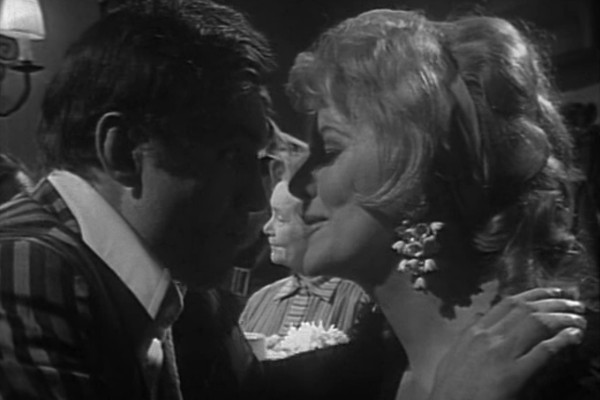
One incredibly ground-breaking element of the series is the suggestion that the leading male character is, particularly in Roy Clarke scripts, a repressed homosexual. With the mission here an undercover investigation into an international dating agency, Hawksworth is concerned that he'll be placed into "emotional conflict" if he has to pretend to be romantically involved. "You know there's a rumour about," he informs Dean, "that we active types are poofs, don't you?" As a television programme of the 70s, then there are lots of mentions of "poofs" (oddly pronounced 'pooves' here), "queens", "nancy boys" and the like.
Although it may seem unthinkable to the audience of today, such matters weren't intended as specifically derogatory at the time, and instead just acknowledging the existence of homosexuals without undue judgement. Even the use of what in 2017 would be regarded as insulting terms are used for satire (Hawksworth's usage of the terms) or plain matter-of-fact readings. Such programmes are, of course, historical documents, and Spyder's Web would have been made in an environment where not only would many of the people in the industry have been secretly gay, but the act of homosexuality had only been decriminalised just four years earlier.
Altogether there's a reference to homosexuality in 10 of the 13 episodes, with Ainley here suggesting that activities in the officer's mess of his army days would see them "get drunk and whip each other's trousers off." While this aspect of Ainley's character occurs throughout much of the series, there are some other episodes by other writers where he defies this reading, such as The Prevalence of Skeletons where he's taken with a nurse's dormitory that he can see through binoculars, or The Executioners, where an unusually randy Hawksworth notes of the secretary: "the thought of that girl lacing up arouses me somewhat."
Overall, this is a very fine episode, perhaps marred only slightly by fine actor Peter Sallis struggling completely with an attempt at a "Russian" accent. The episode marked the second collaboration between writer Roy Clarke and Sallis, after an episode of the anthology series Menace: The Millicent Sisters, Edward de Bruno and Ruth - Where Are They Now? (missing from the BBC archives). The two would find more lasting success from 1973 onwards, with Sallis starring in every episode of Clarke's mammoth Last of the Summer Wine.
This episode achieved the highest ratings for the series, with 7.05m homes (c. 15.5m viewers) which made it the joint 10th most-watched programme that week.
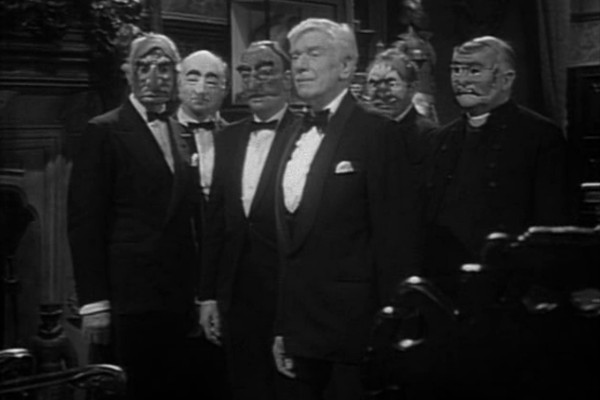
All tastes are, of course, highly subjective, and Spyder's Web divided critics when it was released onto DVD in 2011. However, it's the belief of this site that it's a strong, likeable show with only maybe one or two below-par episodes in the run. What harms the show when judged as a whole is not whether the episodes are strong, but a lack of consistency of vision.
This script by Alfred Shaughnessy (Lies And Dolls) continues where the first episode left off, providing the viewer with some bizarre, left-field plotlines that have you question what you're watching. Sadly, while many of the episodes that followed it are fine, they opt for more "A to B" plotting, with more rigid characterisations and straightforward narratives. They aren't, in the main, bad episodes, but they lack the sheer lunacy of the first two.
To summarise this instalment, then: a group of men, led by a local vicar, are taking people they find morally objectionable onto hunting shoots, then faking their executions. When the targeted people regain consciousness, they are subjected to brainwashing, including a liberal student who is exposed to a loop of right-wing speech: "when he comes to, he'll be a Tory." In order to infiltrate this gang, Ainley uses the front of Arachnid Productions to claim he's making a pornographic movie, involving such debauchery as incest, and is held hostage.
In order to break him out, Charlotte and her secretary Wallis disguise themselves as nuns, with Wallis using drugs to pretend she's been sexually assaulted. The concept of sexual assault is, in the very different world of the 1970s, used for a cheap laugh three times throughout the duration of the series, such as Wallis joking that she's been raped by "Red Indians" in one episode, or the advice that Charlotte gives her after she's fought off an attacker: "Why didn't you let them catch you, you lucky girl?" This episode tops the lot, though, in giving Friday night ITV audiences at 9pm the phrase "nun-raper".
There's a vague political element to this one, as the masked hosts, pictured above, take off their masks with their backs to camera, and are recognised by Hawksworth as being very famous, yet unidentified to the viewers at home. In amongst such crazed plottings is Ainley, clearly having a ball with what can only be described as a shit-eating grin. Tremendously unhinged television.
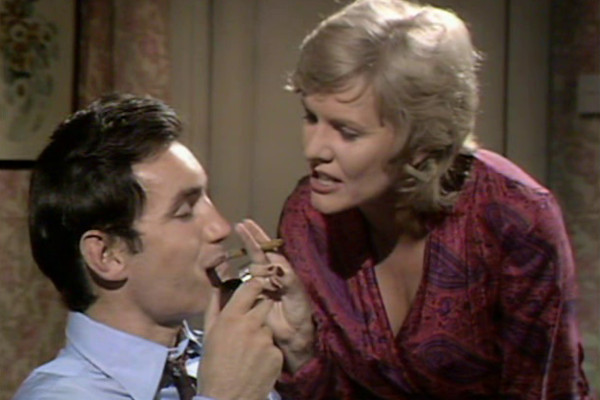
Celebrated novelist and screenwriter Alan Hackney crafts this episode, and his class tells. Although this is a little more of a "straight thriller" than normal, it works very well, and provides moral conflict as a retired admiral is tempted by a bogus defector to see if he'll break. When it becomes clear that he will, Hawksworth clinically assassinates him, while Charlotte shows her disgust.
Although this is one of the two episodes that still exist in colour, the print quality isn't as good as Things That Go Bang In The Night, and there are around 23 seconds of footage that reverts back to black and white. Although the budget for a specialist release like this would be limited, it is a shame that Network couldn't have drummed up the money for colorisation on those scant seconds of b/w material.
However, a plus for fans of Ainley without his shirt is that this time you get to see his bare torso in colour. There's also John Barron (C.J. from The Fall and Rise of Reginald Perrin) as the admiral of the title. A particular innovation is Roger Lloyd-Pack spending the episode telling a vaguely racist joke to scores of people that aren't interested. Throughout the episode different sections of the joke are overheard by the viewer, who is then able to piece together the entire anecdote at the episode's end.
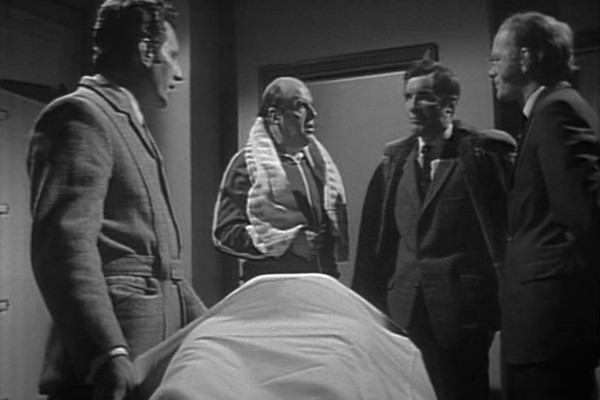
A marvellous opening episode to the series and one which, no matter the quality of the other dozen episodes, they were never quite able to repeat. With Ainley and Cutts locked in a game of cat and mouse, both uttering rude lines about "fanny" and "predatory pussy", this is a sheer delight from beginning to end, a very different kind of series.
Written by Roy Clarke (and script edited, as with all the episodes, by Malcolm Hulke) there is sometimes the feeling that the witty, wordy script is a little beyond Cutts. Although she does well, and relishes some of the sassier lines, there is a suspicion that occasionally she's in a state of recall rather than delivery. Cutts has the unfortunate distinction of being referenced in Roger Moore's autobiography, where he detailed Noel Coward being dismayed with her lack of pure recall in rehearsals for a 1956 play: "she ummed and hesitated, and one day Coward leapt up and said, 'This scene should go "Pop! Pop! Pop!" but now I've had time to read a long book, do my knitting, drop into a dee curtsey and then you said your line.'"
Despite the light-hearted tone on screen, it appears as if the behind-the-scenes issues didn't always make it a happy experience. Filming began on July 7th 1971, just days before Cutts's 45th birthday, yet the pressures upon women for their appearance were even more rigorous than today. Although Cutts looks fine, and gets to use her sexuality in some of the episodes, she revealed in a TV Times interview that an earlier attempt for American stardom never really took off as her figure wasn't fashionable in the States at the time. She was encouraged to use amphetamines to lose weight, which caused mood swings, and Spyder's Web followed a period of inactivity. Veronica Carlson revealed in an interview with classicfilmtvcafe.com that the directors would get angry with Cutts for not being able to keep her weight down, and that "It became an unhappy situation in so many ways. I was not particularly happy on that one."
Such matters are the dark underside to a light-hearted, freefall episode that coasts by on cross-dressing assassinations, Anthony Ainley singing The Ink Spots and Cutts mocking her lithe secretary with the nickname "fat girl". That last element, in particular, is somewhat bittersweet when learning upon Cutts's own problems in the industry. The episode was the highest charting, becoming the 9th most-watched programme of the week, with an audience of 6.9m homes (c. 15m viewers).